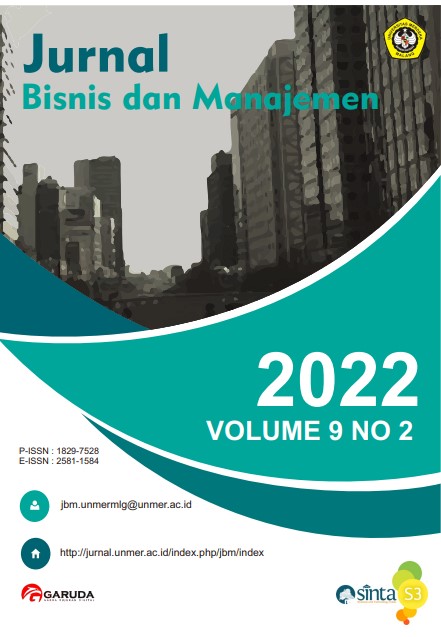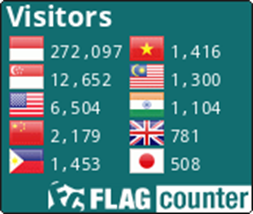Analisis Pengaruh Kecerdasan Emosional dan Keseimbangan Kehidupan Kerja
DOI:
https://doi.org/10.26905/jbm.v9i2.8170Keywords:
Emotional Intelligence, Work-Life Balance, Job Performance, Career DevelopmentAbstract
The study aimed to analyze the relationship between emotional intelligence on employee engagement, job satisfaction, and work-life balance. In addition, analyze the relationship of work-life balance on employee engagement, job satisfaction, and job performance, as well as the effect of performance on career development for employees of one of the world-class tire supplier companies in Suryacipta Industrial Estate, Karawang. The data processing method used structural equation modeling (SEM). The results showed that there is a significant effect of emotional intelligence on employee engagement and work-life balance, but does not have a significant effect on job satisfaction. Work-life balance also has a significant effect on employee engagement, job satisfaction, and job performance. In addition, job performance has a significant effect on career development. The work-life balance of employees needs to be considered by the organization so that employees can carry out two very different roles effectively to increase job performance. Future research is expected to be able to use a more specific questionnaire statement on emotional intelligence variables so that it can provide more representative results.
Downloads
References
Adnyani, N. L. P. R., & Dewi, A. A. S. K. (2019). Pengaruh Pengalaman Kerja, Prestasi Kerja Dan Pelatihan Terhadap Pengembangan Karier Karyawan. E-Jurnal Manajemen, 8(7), 4073–4101. https://doi.org/10.24843/ejmunud.2019.v08.i07.p03
Badrianto, Y., & Ekhsan, M. (2021). Pengaruh Work-life Balance terhadap Kinerja Karyawan yang di Mediasi Komitmen Organisasi. Jurnal Ekonomi & Ekonomi Syariah, 4(2), 951–962. https://doi.org/10.36778/jesya.v4i2.460
Barreiro, C. A., & Treglown, L. (2020). What makes an engaged employee? A facet-level approach to trait emotional intelligence as a predictor of employee engagement. Personality and Individual Differences, 159, 1–8. https://doi.org/10.1016/j.paid.2020.109892
Eliyana, A., Ma’arif, S., & Muzakki. (2019). Job satisfaction and organizational commitment effect in the transformational leadership towards employee performance. European Research on Management and Business Economics, 25(3), 144–150. https://doi.org/10.1016/j.iedeen.2019.05.001
Hair Jr, J. F., Black, W. C., Babin, B. J., & Anderson, R. E. (2010). Multivariate Data Analysis.
Hassan, M., Azmat, U., Sarwar, S., Adil, I. H., & Gillani, S. H. M. (2020). Impact of Job Satisfaction, Job Stress and Motivation on Job Performance : A Case from Private Universities of Karachi. Kuwait Chapter of Arabian Journal of Business and Management Review, 9(2), 31–41. https://doi.org/10.12816/0056346
Jaharuddin, N. S., & Zainol, L. N. (2019). The Impact of Work-Life Balance on Job Engagement and Turnover Intention. The South East Asian Journal of Management, 13(1). https://doi.org/10.21002/seam.v13i1.10912
Lee, H. J. (2017). How emotional intelligence relates to job satisfaction and burnout in public service jobs. International Review of Administrative Sciences, 1–17. https://doi.org/10.1177/0020852316670489
Lingga, A. S. (2020). Pengaruh Keseimbangan Kehidupan Kerja (Work Life Balance) dan Kepuasan Kerja Karyawan terhadap Kinerja Karyawan. Manajemen Bisnis, 6(2), 1134–1137.
Malik, M., Haider, Z., & Hussain, A. (2019). Perceived Emotional Intelligence, Work Life Balance and Job Satisfaction. International Journal of Pharmaceutical Research & Allied Sciences, 8(2), 80–86. www.ijpras.com
Moghaddam, S. A., Tavakoli, A. M., Salajegheh, S., Mehdizadeh, S., & Shokoh, Z. (2022). Work-life balance in nurses working in hospital : a model with the mediating role of emotional intelligence. Social Determinants of Health, 8(1), 1–12.
Niati, D. R., Siregar, Z. M. E., & Prayoga, Y. (2021). The Effect of Training on Work Performance and Career Development: The Role of Motivation as Intervening Variable. Budapest International Research and Critics Institute (BIRCI-Journal): Humanities and Social Sciences, 4(2), 2385–2393. https://doi.org/10.33258/birci.v4i2.1940
Nurjanah, D., & Indawati, N. (2021). Effect Of Emotional Intelligence on Employee Engagement and Job Satisfaction with Work-Life Balance as Intervening Variables In The Generation Z In Surabaya. International Journal of Economics, Management, Bussiness and Social Science, 1(3), 316–328. https://cvodis.com/ijembis/index.php/ijembis
Perera, G. D. N., & L.Wijewardene. (2021). Work Life Balance on Job Performance in Selected Sri Lankan Banks. Asian Journal of Management Sciences & Education, 10(1), 20–27.
Praya, S. M. J., Ghosh, A., Isaac, O., Jesuraj, S. A. V., & Ameen, A. (2019). The Impact of Emotional Intelligence on Work Life Balance among Pharmacy Professionals in Malaysia. International Journal of Management and Human Science, 3(1), 29–34.
Purwanto, E. H., Saputra, E. K., & Risnawati. (2020). Pengaruh Keseimbangan Kehidupan Kerja Terhadap Kepuasan Kerja Anggota Satuan Polisi Pamong Praja Provinsi Kepulauan Riau. Jurnal Manajerial Dan Bisnis Tanjungpinang, 3(1), 72–79.
Santos, A., Wang, W., & Lewis, J. (2018). Emotional intelligence and career decision-making difficulties: The mediating role of career decision self-efficacy. Journal of Vocational Behavior, 107(2018), 295–309. https://doi.org/10.1016/j.jvb.2018.05.008
Sari, I. P., M, A., & Adawiyah, Di. (2021). PENGARUH KESEIMBANGAN KEHIDUPAN KERJA TERHADAP KEPUASAN KERJA PEGAWAI BADAN PENANGGULANGAN BENCANA DAERAH KOTA PADANG. Jurnal Matua, 3(4), 618–631.
Soomro, A. A., Breitenecker, R. J., & Shah, S. A. M. (2018). Relation of work-life balance, work-family conflict and family-work conflict with the employee performance-moderating role of job satisfaction. South Asian Journal of Business Studies, 7(1), 129–146. https://doi.org/https://doi.org/10.1108/SAJBS-02-2017-0018
Sun, L., & Bunchapattanasakda, C. (2019). Employee Engagement: A Literature Review. International Journal of Human Resource Studies, 9(1), 63. https://doi.org/10.5296/ijhrs.v9i1.14167
Talukder, A., Vickers, M., & Khan, A. (2018). Article information : Supervisor support and work-life balance : impacts on job performance in the Australian financial sector Abstract. Emerald Insight, 47(3), 727–744. https://doi.org/doi.org/10.1108/PR-12-2016-0314
Tjiabrata, W., Lengkog, V. P. K., Sendow, G. M., Emosional, P. K., Kehidupan, K., Dan, K., Tjiabrata, W., Ekonomi, F., & Manajemen, J. (2021). Pengaruh Kecerdasan Emosional, Kualitas Kehidupan Kerja Dan Kebahagiaan Di Tempat Kerja Terhadap Keterikatan Karyawan Pada Pt Pln (Persero) Up3 Manado. Jurnal Riset Ekonomi, Manajemen, Bisnis Dan Akuntansi, 9(2), 458–468.
Vasumathi, A., & Sagaya, M. T. (2017). The impact of emotional intelligence on work life balance: An empirical study among the faculty members’ performance in the private universities at Tamil Nadu, India. International Journal of Services and Operations Management, 27(3), 293–323. https://doi.org/10.1504/IJSOM.2017.10005226
Wicaksana, S. A., Suryadi, S., & Asrunputri, A. P. (2020). Identifikasi Dimensi-Dimensi Work-Life Balance pada Karyawan Generasi Milenial di Sektor Perbankan. Widya Cipta: Jurnal Sekretari Dan Manajemen, 4(2), 137–143. https://doi.org/10.31294/widyacipta.v4i2.8432
Downloads
Published
How to Cite
Issue
Section
License
Authors who publish with this journal agree to the following terms:
(1) Copyright of the published articles will be transferred to the journal as the publisher of the manuscripts. Therefore, the author confirms that the copyright has been managed by the journal.
(2) Publisher of Jurnal Bisnis dan Manajemen is University of Merdeka Malang.
(3) The copyright follows Creative Commons Attribution–ShareAlike License (CC BY SA): This license allows to Share — copy and redistribute the material in any medium or format, Adapt — remix, transform, and build upon the material, for any purpose, even commercially.














